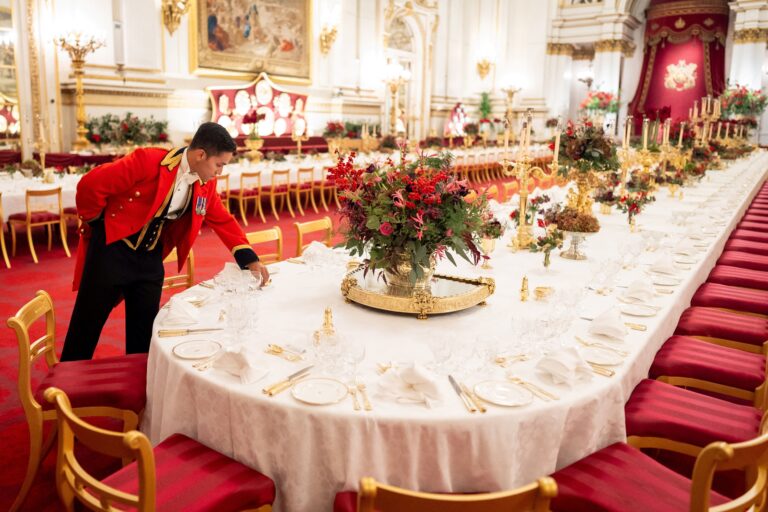Table of Contents
A state banquet is more than just a meal; it’s a carefully curated event designed to foster diplomatic ties, showcase national prestige, and signal alliances. Imagine a hypothetical guest list that includes members of prominent royal families, influential figures associated with the MAGA movement, and leading tech CEOs. What could such a diverse and potentially unconventional gathering tell us about the current landscape of power and influence?
1. The Shifting Sands of Geopolitical Influence
The inclusion of royal families at state banquets is a long-standing tradition, signifying historical ties and diplomatic relationships. Their presence often represents established power structures and a connection to national identity and heritage.
- Royal Presence: Indicates a desire to honor or engage with countries that have strong monarchical traditions or where royalty plays a significant symbolic role. It can also be a nod to historical alliances and cultural exchanges.
The presence of figures associated with the MAGA movement, particularly if they are invited by a host nation seeking to engage with specific political factions or ideologies, would signal a departure from traditional diplomatic guest lists.
- MAGA Figures: Their inclusion could suggest an attempt to engage with a particular segment of the electorate or political discourse in a host country, or perhaps a recognition of the movement’s international resonance. This might highlight a strategy of direct engagement with influential non-governmental actors.
Tech CEOs, on the other hand, represent a newer, yet increasingly dominant, form of global influence.
- Tech CEOs: Their invitations underscore the economic and technological power wielded by major tech companies. They are often invited to discuss innovation, investment, digital infrastructure, and the future of global commerce. Their presence signifies that economic might and technological advancement are now integral components of international relations.
The combination of these groups would suggest a complex diplomatic strategy, potentially aiming to: * Bridge Traditional and Modern Influence: Reaching out to both established power (royalty) and emerging political forces (MAGA) while also acknowledging the undeniable impact of the tech sector. * Signal a Multi-Polar World: Recognizing that influence is no longer solely vested in traditional governments or historical dynasties but is now distributed across various political, economic, and ideological spheres.
2. Economic Power and Technological Frontiers
The tech CEOs at such a banquet would be central figures, representing industries that are reshaping economies and societies worldwide.
- Innovation and Investment: Their presence would highlight opportunities for technological collaboration, foreign investment, and the adoption of new digital solutions. Discussions might revolve around artificial intelligence, cybersecurity, quantum computing, and sustainable technology.
- Economic Diplomacy: Tech giants are significant employers and economic engines. Host nations would likely seek to leverage these companies for job creation, infrastructure development, and market access.
The inclusion of MAGA figures might also have economic undertones, particularly if their platforms emphasize national economic policies, trade renegotiations, or protectionist measures.
- Trade and National Interest: Their invitation could signal a focus on bilateral trade agreements, a re-evaluation of global supply chains, or a push for policies that prioritize domestic industries.
Royal families, while historically associated with land and lineage, also represent significant economic interests through their own investment portfolios and the symbolic economic value they bring to their nations through tourism and cultural branding.
- Heritage and Tourism: Royal patronage can significantly boost tourism and cultural industries, adding another layer to the economic discussions at the banquet.
3. Evolving Social and Political Narratives
The guest list would also offer insights into the prevailing social and political narratives that host nations wish to engage with or project.
- Ideological Spectrum: The juxtaposition of royal traditions, the populist “America First” ethos often associated with MAGA, and the globalist, innovation-driven outlook of tech leaders would create a fascinating dynamic. It could reflect a host nation’s attempt to navigate or appeal to a broad spectrum of domestic and international audiences.
- Cultural Exchange and Soft Power: Royal families are often ambassadors of their nation’s culture and history. Their presence can facilitate discussions on cultural heritage, arts, and education.
- The Future of Governance: The inclusion of tech leaders could prompt discussions about the role of technology in governance, digital citizenship, and the ethical implications of advanced technologies. This might even extend to discussions on how technology can interface with or influence traditional forms of leadership, including monarchies.
Conclusion: A Mirror to a Complex World
A state banquet guest list featuring royals, MAGA figures, and tech CEOs would be a potent symbol of our times. It would reflect a world where traditional power structures coexist with populist movements and where technological innovation has become a primary driver of global economics and diplomacy. Such a gathering would necessitate a delicate balancing act, acknowledging diverse influences and navigating potentially conflicting ideologies, all while aiming to foster understanding and cooperation on the global stage. It would be a clear indication that understanding contemporary international relations requires looking beyond established diplomatic circles and embracing the multifaceted nature of influence in the 21st century.

